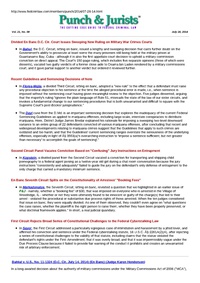Loaded on
July 28, 2014
published in Punch and Jurists
July 28, 2014
Overruling its decision in U.S. v. Sevilla, 541 F.3d 226 (3d Cir. Sept. 4, 2008), a divided Third Circuit, sitting en banc, held that a procedural error at sentencing is preserved only if a party objects after sentence is imposed or at the time that the procedural error becomes …
Loaded on
July 28, 2014
published in Punch and Jurists
July 28, 2014
This is a significant sentencing decision in which Judge James Bredar discussed his reasons for imposing sentences that were significantly less than the advisory Sentencing Guideline range for marijuana-related offenses, based on the “new enforcement priorities” of the Department of Justice and the “recent enactments of state voters and …
Loaded on
July 28, 2014
published in Punch and Jurists
July 28, 2014
This is an interesting decision about a relatively new statute that is becoming increasingly popular with Federal prosecutors. Since 1996, Congress has enacted a number of Federal stalking laws, including the Federal cyberstalking statute - 18 U.S.C. § 2261A(2)(A) (2006) - which, at the times relevant to this case, …
Loaded on
July 28, 2014
published in Punch and Jurists
July 28, 2014
In a long-awaited decision about the authority of military commissions under the Military Commissions Act of 2006 (“MCA”), Pub. L. No. 109-336, 120 Stat. 2600, the D.C. Circuit, sitting en banc, vacated two guilty verdicts rendered by a military commissions court of a former close aide to Osama bin …
Loaded on
July 28, 2014
published in Punch and Jurists
July 28, 2014
This is an interesting (but highly fact-specific) decision in which a divided panel from the Second Circuit vacated a conviction for transporting and shipping child pornography on the grounds that the instructions given to the jury regarding the defendant’s defense of entrapment were so confusing that they called into …
Loaded on
July 28, 2014
published in Punch and Jurists
July 28, 2014
In Markadonatos v. Village of Woodridge, 739 F.3d 984 (7th Cir. Jan. 8, 2014) (“Markadonatos I”) (P&J, 06/02/14), a divided panel from the Seventh Circuit affirmed the dismissal of a putative class action filed by a person who was arrested within the jurisdiction of the Village of Woodridge and …
